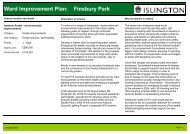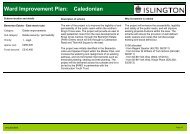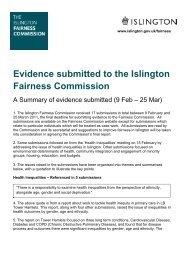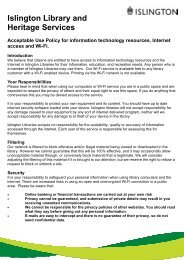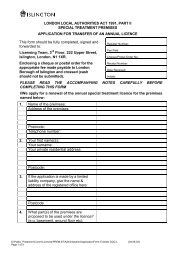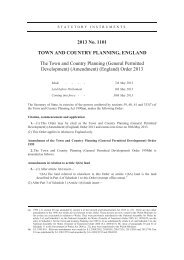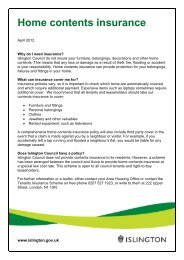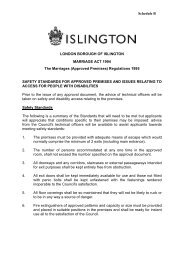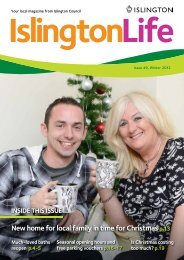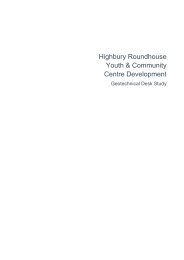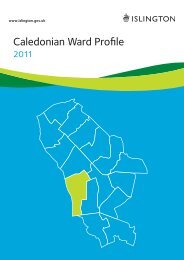Two Islingtons: Understanding the Problem - Islington Council
Two Islingtons: Understanding the Problem - Islington Council
Two Islingtons: Understanding the Problem - Islington Council
Create successful ePaper yourself
Turn your PDF publications into a flip-book with our unique Google optimized e-Paper software.
6.13. <strong>Islington</strong>’s Food Strategy was developed in partnership with LBI, NHS <strong>Islington</strong>,<br />
Cambridge Education and organisations from <strong>the</strong> voluntary sector. The strategy is based<br />
around 3 key <strong>the</strong>mes; Food and Poverty, Food and Health and Food and <strong>the</strong> Environment.<br />
It sets out 10 key objectives including; Promoting a healthy diet, Making healthy food<br />
accessible, Making healthy food affordable, Promoting safer food, Reducing our<br />
environmental footprint, Promoting local food, Promoting ethical food, Reducing food<br />
waste, Celebrating food and diversity, Identifying and targeting high risk groups. A detailed<br />
action plan has been developed for each objective which is now being delivered by key<br />
stakeholders from <strong>the</strong> <strong>Council</strong>, NHS and voluntary sector. As part of this a borough Food<br />
Partnership is being set up, involving residents, community groups and organisations in<br />
developing projects which will tackle local food issues.<br />
6.14. One of <strong>the</strong> key projects to be delivered in <strong>the</strong> first year of <strong>the</strong> Food Strategy was <strong>the</strong><br />
<strong>Council</strong>’s community food growing programme Edible <strong>Islington</strong>. Edible <strong>Islington</strong> was<br />
developed to meet a number of key aims in tackling inequality. These were to:<br />
• Increase <strong>the</strong> availability of healthy affordable food to communities on low incomes<br />
• Increase levels of both physical and mental health through food growing<br />
• Increase social cohesion and community wellbeing<br />
• Increase knowledge and awareness of <strong>the</strong> production of local food and its wider benefits<br />
The programme is nearing completion and has establish new community food growing<br />
projects across <strong>Islington</strong> as well as providing support, training and resources to residents<br />
to help <strong>the</strong>m grow local food. Edible <strong>Islington</strong> has funded over 85 new food growing<br />
projects. It is estimated that <strong>the</strong> programme has benefitted around 7500 residents through<br />
<strong>the</strong> development of <strong>the</strong>se spaces with a fur<strong>the</strong>r 1000 residents benefitting from <strong>the</strong> range<br />
of training and support programmes that have run alongside <strong>the</strong> programme.<br />
6.15. The impact of <strong>the</strong> various initiatives in place to tackle health inequalities will take time to be<br />
realised, as long term health outcomes are hard to measure over short to medium periods<br />
of time. Poor health is also attributed to many o<strong>the</strong>r issues such as poor housing and<br />
access to good quality open space and <strong>the</strong>refore projects and activities which improve<br />
outcomes in <strong>the</strong>se areas, particularly for <strong>the</strong> most disadvantaged, will help to improve long<br />
term health outcomes.<br />
7. Empowering <strong>the</strong> community to tackle inequality<br />
7.1. Under <strong>the</strong> Transforming Social Care programme a number of activities and actions have<br />
been implemented to broaden <strong>the</strong> choice and improvement in <strong>the</strong> quality of care and<br />
support service supplied. The <strong>Council</strong> is working with providers to influence <strong>the</strong>ir<br />
development. We have been running education seminars for local providers to help <strong>the</strong>m<br />
prepare for personal budgets. We are starting a series of capacity building events<br />
focusing on developing <strong>the</strong> services that we know users want more of, such as personal<br />
assistants. (A personal assistant is a flexible care worker, who will carry out a range of<br />
personal and social tasks and is typically employed by <strong>the</strong> service user directly). The<br />
transformation of adult social care is being developed with existing service users, <strong>the</strong>ir<br />
carers and o<strong>the</strong>r citizens, for example we fund and support two dedicated forums that work<br />
alongside staff on <strong>the</strong> implementation of social care transformation, including personal<br />
budgets. One group is a network comprising over 40 local groups that represent service<br />
users and carers, such as <strong>the</strong> <strong>Islington</strong> Mental Health User Group and <strong>the</strong> Learning<br />
14




